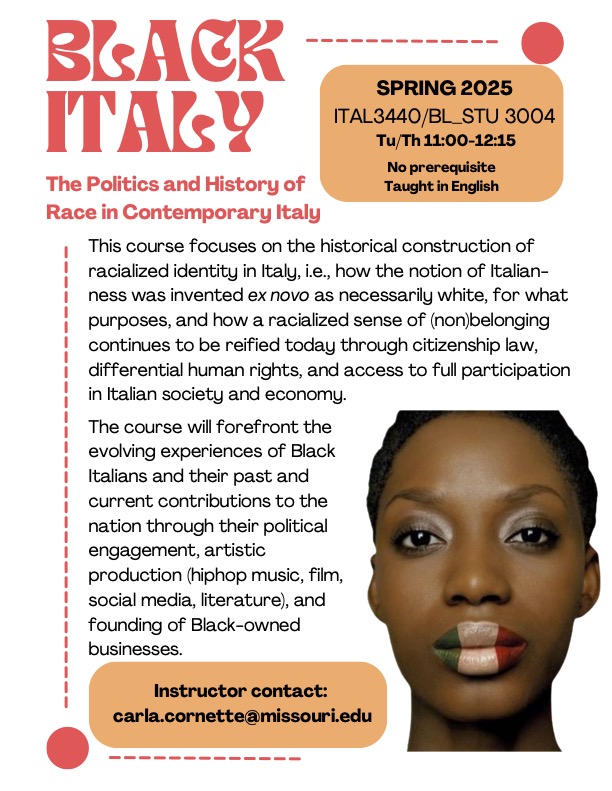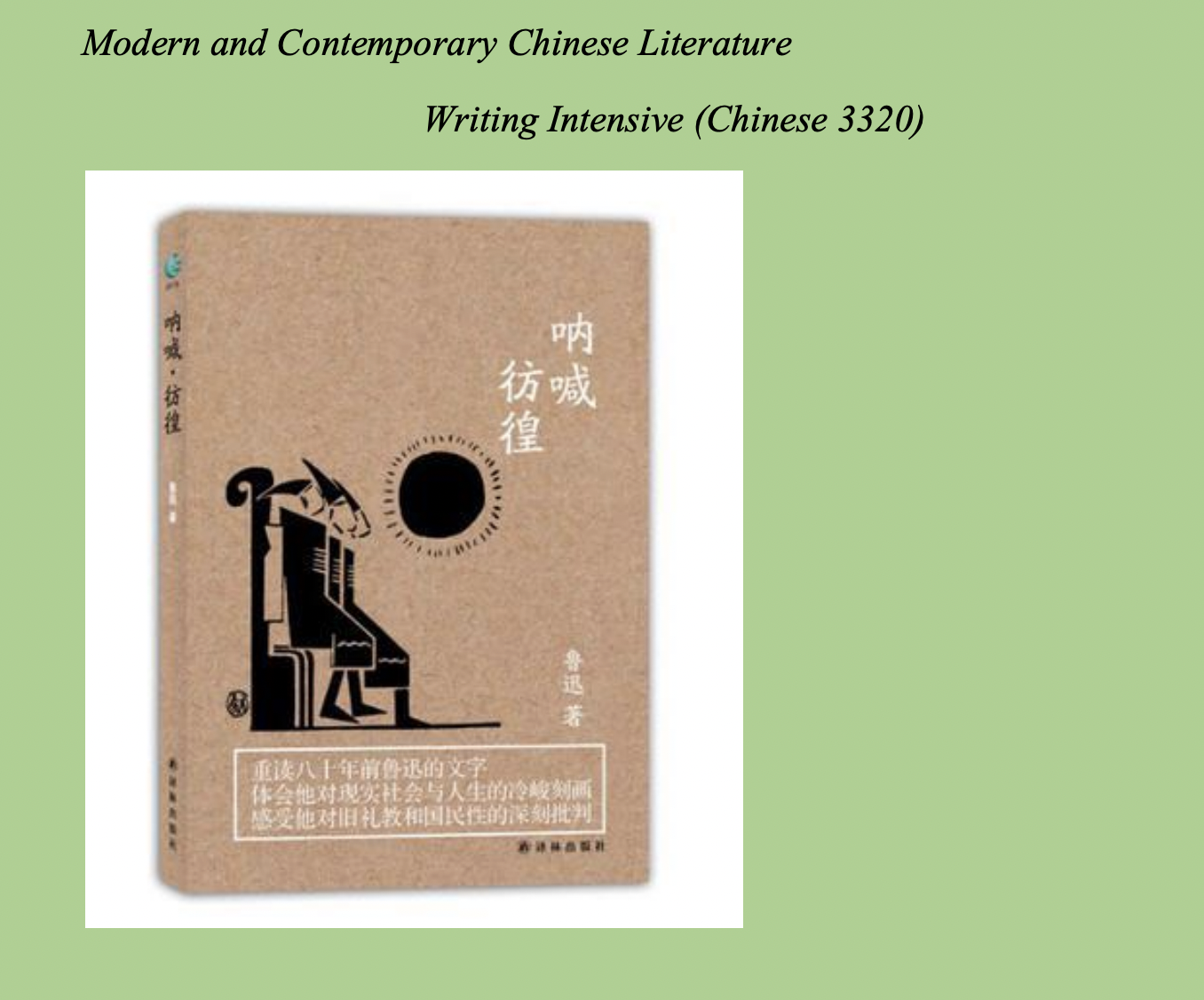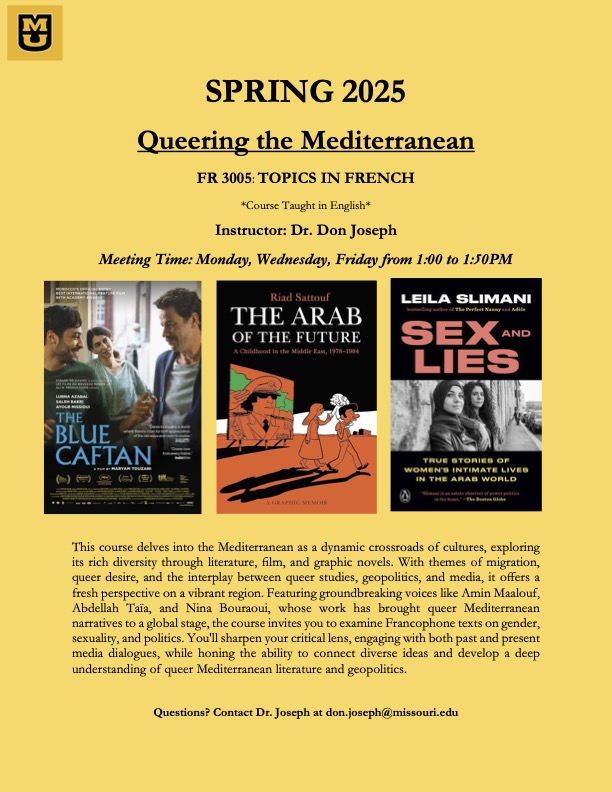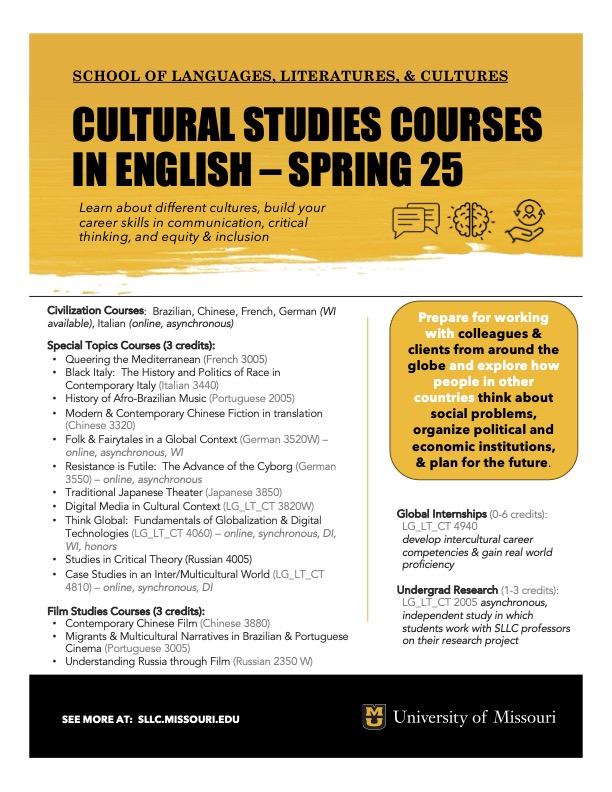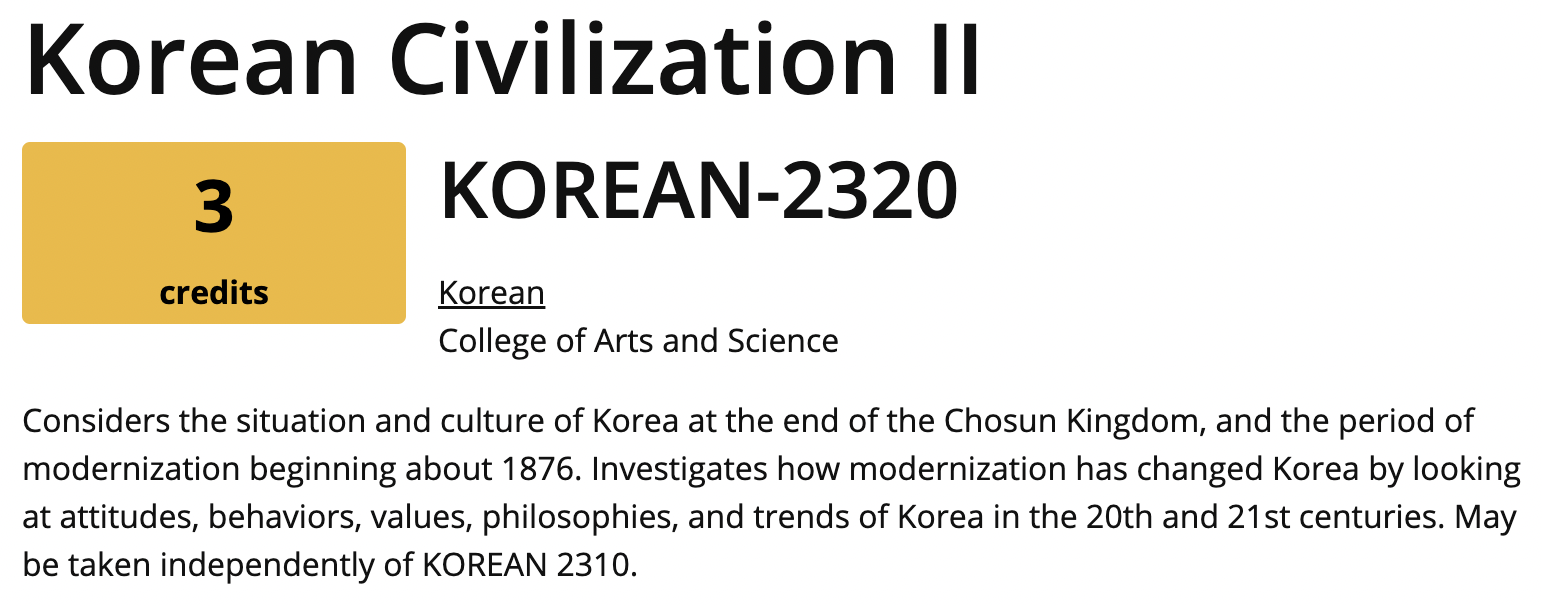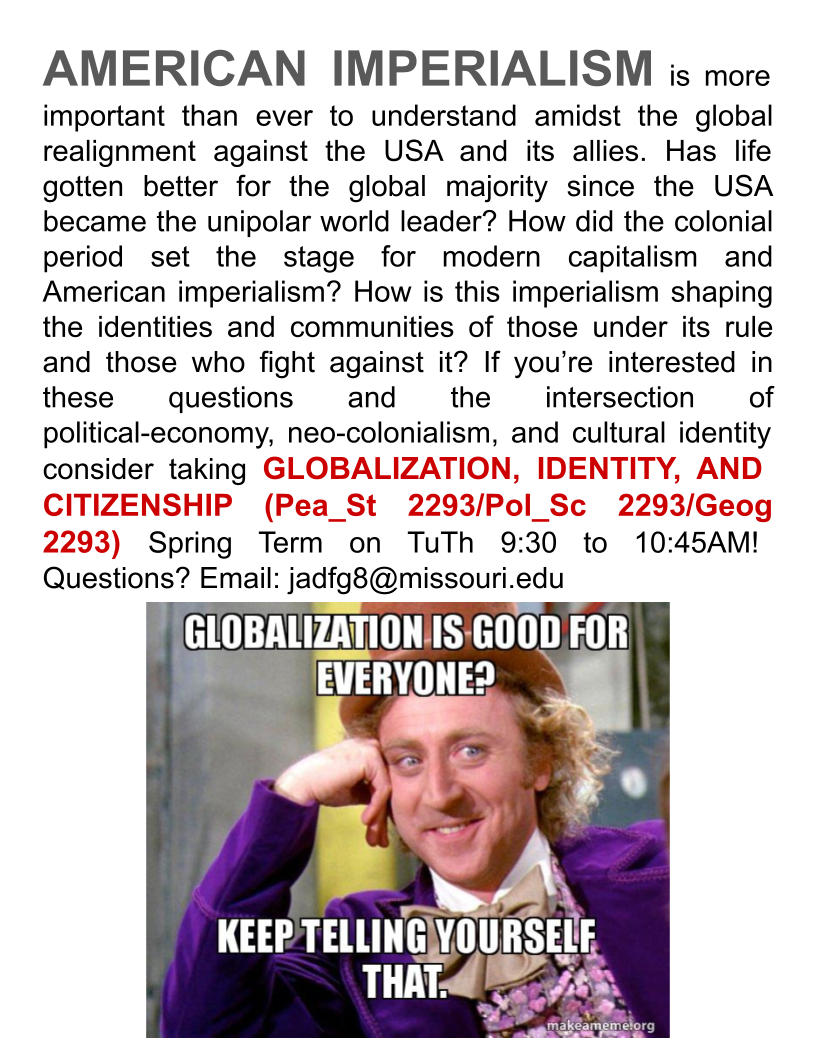2025 Spring Courses

WGST 4001: GENDER ENVIRONMENT & DEVELOPMENT
T/Th 12:30-1:45pm, March 17 - May 16
Dr. Pallavi Raonka is teaching Gender, Environment, & Development for the second eight weeks of this spring semester. This course explores gender, environment, and international development through theoretical and applied perspectives using case studies from Africa, Asia, and Latin America. Students engage in hands on learning with local GOs. Topics include critical development theory, feminist frameworks, eco-feminism, feminist political ecology, agriculture, natural resources, climate change, participatory research methods, and empowerment. The course emphasizes both classroom theory and real world application through service learning. This will count as a WGST core course for WGST majors and minors, and it will count towards the International Studies major.
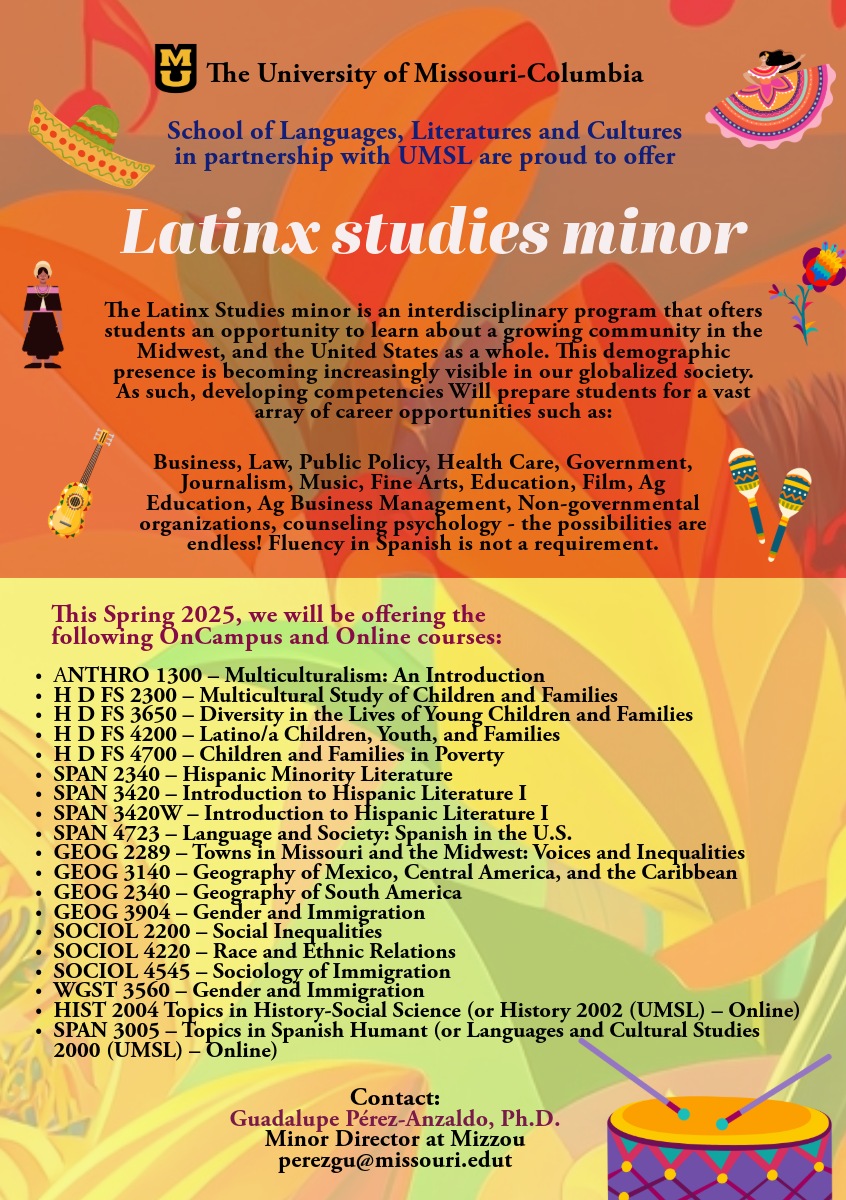
LatinX Studies Minor
The LatinX Studies minor is an interdisciplinary program that offers students an opportunity to learn about a growing community in the Midwest and the United States. This demographic presence is becoming increasingly visible in our globalized society. As such, developing competencies will prepare students for a vast array of careers opportunities such as: Business, Law, Public Policy, Health Care, Government, Journalism, Music, Fine Arts, Education, Film, Agriculture, Education, Ag Business, the possibilities are endless! Fluency in Spanish is not a requirement.
Black Italy: The Politics and History of Race in Contemporary Italy
This course focuses on the historical construction of racialized identity in Italy, i.e., how the notion of Italianness was invented ex novo as necessarily white, for what purposes, and how a racialized sense of (non)belonging continues to be reified today through citizenship law, differential human rights, and access to full participation in Italian society and economy. The course will forefront the evolving experiences of Black Italians and their past and current contributions to the nation through their political engagement, artistic production (hiphop music, film, social media, literature), and founding of Black-owned businesses.
Chinese 3320 – Modern and Contemporary Chinese Literature (WI)
Mo/We/Fr, 9:00-9:50am
Writing Intensive is a general introduction to the fiction, poetry, and essays of twentieth century China in the context of history. Students will read and analyze the major works from the May 4th Period, the era of social realism, the Cultural Revolution, and the post-Mao era critically. All literature readings will be in English. No knowledge of Chinese language or culture is necessary.
FR 3005: Queering the Mediterranean
Mo/We/Fr 1-1:50pm
This course delves into the Mediterranean as a dynamic crossroads of cultures, exploring its rich diversity through literature, film, and graphic novels. With themes of migration, queer desire, and the interplay between queer studies, geopolitics, and media, it offers a fresh perspective on a vibrant region. Featuring groundbreaking voices like Amin Maalouf, Abdellah Taïa, and Nina Bouraoui, whose work has brought queer Mediterranean narratives to a global stage, the course invites you to examine Francophone texts on gender, sexuality, and politics. You'll sharpen your critical lens, engaging with both past and present media dialogues, while honing the ability to connect diverse ideas and develop a deep understanding of queer Mediterranean literature and geopolitics.
RUSS 3380: Sinners, Saints, and Madmen: 19th Century Russian Literature
T/Th 12:30pm–1:45pm
A discussion-based survey course of 19th-century fiction that traces development of signature themes of Russian literature that continue to the present: saints and sinners; “madness”; the myth of St. Petersburg (at its rivals Moscow and the Russian provinces); and superfluous men and sacrificial women. Across these themes we will also consider the complicated relationship of Russian literature and its authors to both their present moment and the historical past. Authors include major ” figures of the long Russian literary 19thcentury (Pushkin, Gogol, Dostoevsky, Tolstoy, Chekhov) as well as overshadowed ones, including the “hidden” tradition of Russian women writers of the period. Readings and discussion in English; no previous knowledge of Russian literature or culture required. Course currently requires sophomore standing, but first-year students can reach out directly to the instructor, Dr. Monnier (monniern@missouri.edu) for permission number.
HIST 4970W - War, Atrocity, and Memory Politics in Modern East Asia
Th 2-4:20 pm, Instructor: Dominic Meng-Hsuan Yang
This history senior seminar course examines a number of traumatic events in modern East Asia. These include the Rape of Nanking (China), the Cultural Revolution (China), the atom bombing of Hiroshima and Nagasaki (Japan), the comfort women/sexual slavery (Korea, Taiwan, Japan, and China), the 228 Massacre (Taiwan), and more. The course focuses not only on the history of these events, but also their legacies in today’s world. We discuss issues concerning commemoration, reparation, apology, museums/public exhibitions, media/social media representations, and international disputes. As a writing intensive course, the attainment of credit requires students to produce a full-length (15-20 page) research paper through a multi-step writing process. The process involves: (1) identification of a historiographical research question via seminar learning and discussion; (2) a draft-producing practice, where students submit preliminary drafts and receive both instructor comments and feedback from their peers via class presentations and Q&A sessions. Students are required to do at least two rounds of draft revision to take account of the comments, criticisms, and corrections raised by the instructor and their peers in an effort to produce a high-quality final research paper.
SLLC - School of Languages, Literatures, and Culture
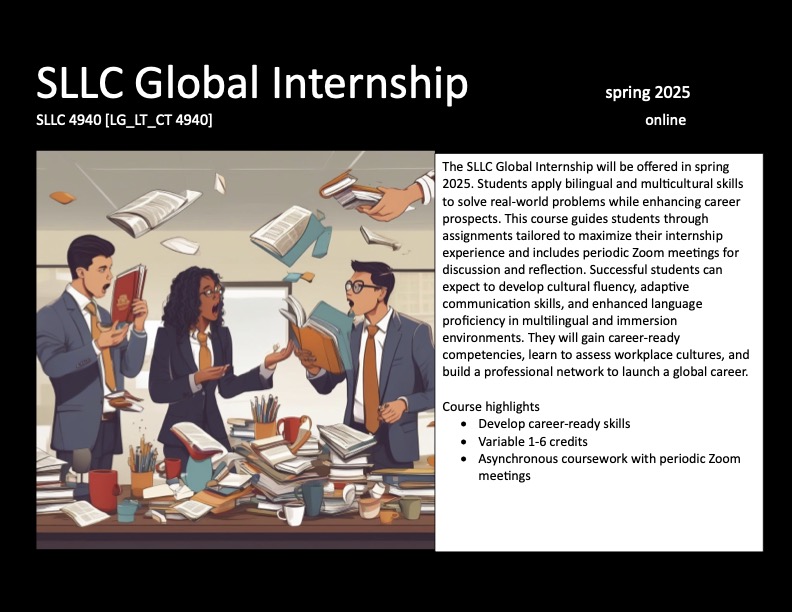
SLLC 4940 - SLLC Global Internship
The SLLC Global Internship will be offered in spring 2025. Students apply bilingual and multicultural skills to solve real-world problems while enhancing career prospects. This course guides students through assignments tailored to maximize their internship experience and includes periodic Zoom meetings for discussion and reflection. Successful students can expect to develop cultural fluency, adaptive communication skills, and enhanced language proficiency in multilingual and immersion environments. They will gain career-ready competencies, learn to assess workplace cultures, and build a professional network to launch a global career. 1-6 credits offered.
SLLC Cultural Studies Courses
All of these courses are taught in English. See and Learn about different cultures, build your career skills in communication, critical thinking, and equity & inclusion. Courses appear in the pdf to the left of the text, click on the photo to see all courses. The course list includes but is not limited to Queering the Mediterranean, Folk and Fairytales in a Global Context, Traditional Japanese Theater, or Studies in Critical Theory.
SLLC 3820/DigST 3005 – “The Writing’s on the Web”: Digital Media in Cultural Context
T/Th 11:00-12:15pm
People around the world have come to live ever-greater portions of their daily life online, not only consuming but also producing texts about themselves, their lives, and their worlds. In the process, writing takes place less and less in handwritten or printed form and more and more online—to modify the familiar cliché the writing’s on the wall: “the writing’s on the web!” In this course we will examine various forms of web-based writing—blogging, texting, tweeting, posting on social media, podcasting, etc.— from both a theoretical and practical angle, focusing in particular on the question of how users define, consume, and interpret digital media online and how questions of media use are addressed differently in varied cultural contexts. A 3000-level, writing-intensive course, “The Writing’s on the Web” asks you to think carefully about writing on digital platforms as a communicative practice with its own distinctive history, possibilities, and pitfalls.
Instructor: Sean Franzel, franzels@missouri.edu
Korean Studies
Korean 2320 - Korean Civilization II
T/Th, 2-3:15pm
Considers the situation and culture of Korea at the end of the Chosun Kingdom, and the period of modernization beginning about 1876. Investigates how modernization has changed Korea by looking at attitudes, behaviors, values, philosophies, and trends of Korea in the 20th and 21st centuries.
Korean 3001 – Topics in Korean – General
T/Th, 3:30-4:45pm
Dive into an exciting journey through Korean culture with our immersive course that brings the essence of Korea to life through its captivating dramas, films, and music! Each week, you’ll watch engaging snippets from popular Korean movies and shows, highlighting unique aspects of the culture. From the delicious flavors of Korean cuisine to the beauty of traditional homes and fashion, we’ll explore a variety of fascinating topics that showcase the rich tapestry of Korean life. This course is designed not just to teach you about Korean culture but to immerse you in it, offering you a fresh and dynamic perspective that goes beyond the usual classroom experience.
Religious Studies
REL_ST 1500 – Religion and Culture
Mo/We/Fr 9:00-9:50am
The study of religion as expressed in art, literature, music, dance, drama, architecture.
REL_ST 2330 – Buddhism, Money, and Capitalist Economy
Mo/We/Fr 2:00-2:50pm
Interrogating the entanglement between Buddhism and the pursuit of material wealth, this course introduces students to the ethical principles for Buddhist social organization, material exchanges, and business practices. Buddhism as a lived tradition will be explored through examination of historical examples and Buddhist technologies and Buddhist popular culture in the modern market economy. Topics will include the origins of Buddhism and merit-making, the post-Merit economy, contemporary business practices, and Buddhist critiques of capitalist economy.
REL_ST 2510 - Introduction to the World of the New Testament
Mo/We/Fr 11:00-11:50am
An introduction to the books of the New Testament and the methods and principles guiding its academic study. Emphasis is placed on Jesus' and his disciples' Jewish heritage and the relationship and interactions between Judaism and Christianity over the decades the NT books were written and compiled. Attention is give to the character of the Roman world in which Christianity grew and found the bulk of its converts. Finally, stress is given to the texts that were not accepted into the canonical NT, the Christians whose views those texts represent, and their differences from those Christians whose views became orthodox.
REL_ST 3350W - Monsters in Western Religion and Folklore - Writing Intensive
T/Th 12:30-1:45pm
This course focuses on monsters found in Western cultures and more specifically how monsters are instantiated and put to use in contexts of popular culture. Theoretical and methodological approaches to the material are drawn from both Religious Studies and Folkloristics.
AMS/REL_ST 4005/7005 - Archaeology of Cult in the Ancient Mediterranean
T/Th 12:30-1:45pm
For scholars of the ancient Mediterranean world, the terms “cult” and “religion” comprise a dizzying array of beliefs and practices, sanctuaries and spaces, objects, gods, and humans. This diversity challenges contemporary definitions of religion, which tend to follow the model of Protestant Christianity, privileging belief, texts, and rationality. This course takes a different approach to cult and religion in the ancient Mediterranean, focusing instead on the importance of archaeology and material culture in reconstructing ancient religious experience. The course will examine case studies that illustrate the challenges and rewards of thinking about religion materially, from Classical Greece through the beginning of late antiquity
Ancient Mediterranean Studies
AMS 2070 - Cultural Ancestors of the Greeks and Romans: Roots and Branches of Indo-European Myth and Religion (WI)
T/Th 3:30-4:45pm
This course will introduce you to the mythical and religious traditions that the Greeks and Romans inherited from the Indo-Europeans, a group of people whose language and culture developed into numerous languages and cultures of Eurasia. You will become familiar with some of the fundamental traditions that the cultural ancestors of the Greeks and Romans transmitted to their descendants, including stories about giants and dragons, and rituals involving bestiality and animal sacrifice. In combination with Greek and Roman mythology and religion, we will study related mythical narratives and religious traditions from North India, Iran, Scandinavia, and Ireland.
AMS 1140 - Ancient Cities
Asynchronous INTERNET
Today, more than half of the world's population lives in an "urban area." More than 80% of the people who live in the United States dwell in what we call "cities." Every year, more and more people are drawn to these urban centers. Needless to say, this was not always the case. What are the historical origins of cities? What sparked the urbanization process? How were ancient cities organized, and how were they different from the urban centers today? What was it like to walk around ancient Uruk, Athens, or Rome? Ancient Cities is an introductory survey to the urban centers of the ancient Near Eastern, Egyptian, and Mediterranean worlds. We will begin with the earliest known settlements in the Near East, ca. 9000 B.C., and trace urbanization as far as Imperial Rome and Late Antiquity. The purpose of the course is to examine the characteristics of urbanism, and the archeological evidence for settlement structure, urbanization and state-formation in different cultures of the ancient Mediterranean world.
Peace Studies
PEA_ST 1051 – Globalization, Identity, and Citizenship
T/Th 9:30am–10:45am
American imperialism is more important than ever to understand amidst the global realignment against the USA and its allies. Has life gotten better for the global majority since the USA became the unipolar world leader? How did the colonial period set the satge for modern capitalism and American imperialism? How is the imperialism shaping the identities and communities of those under its rule and those who fight against it? If you’re interested in these questions and the intersection of political economy, neo-colonialism, and cultural identity consider taking Globalization, Identity, and Citizenship.
Contact for More Info: jadfg8@missouri.edu.
PEA_ST 1051 – International Conflict Resolution & Group Reconciliation
T/Th 9:30am -10:45am
How do societies reconcile after a war or genocide? Is peace achievable after an atrocity? Do treaties and truth commissions really help societies move forward? This course will study achieving peace through techniques and institutions that attempt personal and interactive reconciliation of opposing groups. Case studies include South Africa, Sudan, Guatemala, Ireland, Israel-Palestine, and Russia-Ukraine (among others). This course also reviews nuclear treaties, climate change protocols, and United Nations Peacekeeping missions.
